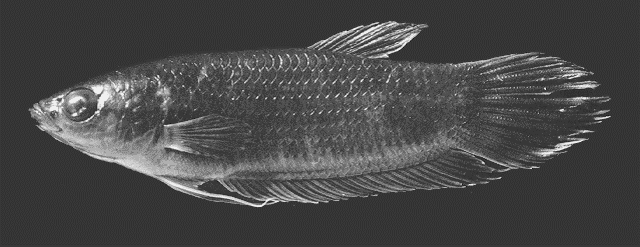| Osphronemidae (Gouramies), subfamily: Macropodusinae |
| 8.22 cm SL (male/unsexed) |
|
benthopelagic; freshwater; pH range: 4.5 - 7.5; dH range: 1; depth range - 1 m |
| Asia: lower Barito basin in South Kalimantan and Kotawaringin, Katingan, Sampit, Mentaya and Kahayan basins in Central Kalimantan, Indonesian Borneo. |
|
Dorsal spines (total): 0-1; Dorsal soft rays (total): 8-9; Anal spines: 1-2; Anal soft rays: 27-29; Vertebrae: 30-31. Can be distinguished from other species in possessing the following combination of characters: a thick-set body (body depth 30.5-33.7 % SL) with the anterior part of the body reminiscent of the taxon Anabas; head devoid of pattern except for a preorbital stripe that runs from the black lower lip to the eye, and continuous with a postorbital stripe to the posterior edge of the opercle; in living specimens, the opercle with faint gold iridescent scales; and some median caudal rays projecting beyond the fin margin (Ref. 81926).
Description: dorsal fin situated far back; caudal fin lanceolate; pelvic fin filamentous (Re. 81926). |
| Found in a murky stream, up to 1.2 m deep and pH 7.5. The stream water was sluggish and drained from cultivated area upstream (Ref. 81926). Seen only in local markets. Mouth brooder (Ref. 4537). |
|
Least Concern (LC); Date assessed: 05 December 2018 Ref. (130435)
|
| harmless |
Source and more info: www.fishbase.org. For personal, classroom, and other internal use only. Not for publication.
